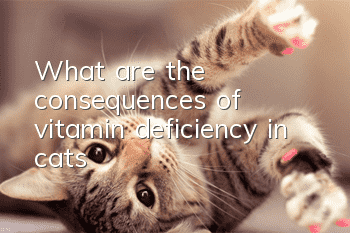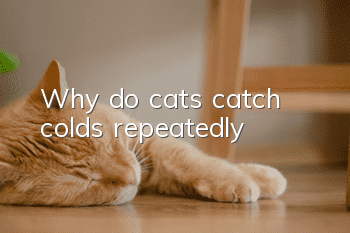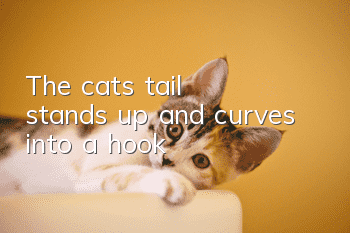What are the consequences of vitamin deficiency in cats?

Vitamins are a kind of trace elements that cats need. There are many types of vitamins, usually divided into fat-soluble vitamins and water-soluble vitamins. If cats are picky eaters or have an unbalanced diet, they can easily cause vitamin deficiency. Let’s talk about the different manifestations of various vitamin deficiency symptoms
1. Deficiency of fat-soluble vitamins
1. Vitamin A deficiency: The main symptoms of vitamin A deficiency are: inflammation of the eyes and nose, swelling of the eyelids, decreased vision, tofu-like discharge from the eyes, and sometimes the upper and lower eyelids stick together. The coat is loose and matted. Movement disorders. Some cats develop dry eye disease, or the eyeball on one side is sunken, but the eyeball is not damaged and they still have vision. In severe cases, corneal perforation may occur, leading to outflow of atrial fluid and blindness. When kittens are deficient in vitamin A, their growth and development may be retarded or stopped.
2. Lack of vitamin D: If the cattery is dark and the light is insufficient, and the female cat is fed in a dark place for a long time, the 7-dehydrocholesterol in the skin cannot be converted into vitamin D3, so a serious deficiency of vitamin D may occur in the milk, leading to Kittens are deficient in vitamin D; kittens lack light after weaning and fail to supplement vitamin D in their food, which is also an important factor in causing this disease. In addition, indigestion, difficulty in absorption, chronic enteritis, diarrhea, large amounts of parasites, etc., can all cause vitamin D malabsorption and cause the disease. At the beginning of the disease, heterophilic phenomena appear, such as licking soil, walls, dirt, or nearby animals and their own abdomen. Teeth grow slowly or tooth replacement is delayed. Joint pain gradually occurs, with a stiff gait, limp, difficulty in standing, swelling and deformation of the joint ends; abnormal posture, showing an O-shaped leg or an X-shaped leg posture. The junction of the ribs and costal cartilage is swollen, forming a bead shape, the sternum is sunk, the spine is curved, and the pelvis is narrow; the maxilla is swollen, the mouth becomes narrow, nasal congestion and dyspnea occur, and chewing is careful and slow. The sick cat is in low spirits, likes to lie down and move around, and gradually loses weight. In severe cases, the patient cannot stand while lying on the ground, resulting in bedsores and septicemia.
3. Lack of vitamin E: Feeding cats food that lacks vitamin E for a long time, or feeding fish and meat with too much unsaturated fatty acids or that have been refrigerated for too long will cause vitamin E deficiency. Vitamin E is also called tocopherol. When a cat lacks vitamin E, it will significantly affect the development of its sexual organs. If a female cat suffers from this disease, the development of her placenta and fetus during pregnancy will be affected, which can lead to empty pregnancy, miscarriage and death of the kittens. Male cats are characterized by underdeveloped testicles and reduced or degenerated sperm vitality. Sick cats show yellow fat disease and incomplete muscle tissue.
4. Lack of vitamin K: The function of vitamin K is to promote the synthesis of prothrombin in the liver. If it is lacking, the blood will not clot easily during bleeding. Sick cats are prone to bleeding and have difficulty coagulating.
2. Lack of water-soluble vitamins
Vitamin B deficiency is mainly caused by long-term feeding of a single food, vitamin B deficiency, or intestinal disease, which destroys intestinal synthesis and absorption, or increases metabolism and renal excretion. .
1. Lack of vitamin B1: The viscera of some molluscs and fish contain thiamine enzyme that destroys vitamin B1. If cats are fed raw fish and molluscs for a long time, vitamin B1 deficiency may occur; while long-term feeding of canned animals may cause vitamin B1 deficiency. Loading feed can also easily lead to this disease. In addition, female cats need a large amount of vitamin b1 during late pregnancy, lactation and when they develop high fever. If they are not supplemented in time, they are prone to this disease. Sick cats will suffer from loss of appetite, vomiting, dehydration, and weight loss. In severe cases, they may be accompanied by neuritis, cardiac dysfunction, convulsions, ataxia, paralysis, collapse, and finally death from heart failure.
2. Lack of vitamin B2: Sick cats develop anorexia, weight loss, hair loss and other symptoms. They are prone to conjunctivitis, corneal opacity (cataracts in severe cases), hind limb muscle atrophy, and underdeveloped testicles in male cats. Severe cases may lead to death.
3. Lack of pantothenic acid: kittens grow slowly, have dull coat color, rough skin, gastrointestinal dysfunction and even gastrointestinal ulcers.
4. Lack of niacin: Sick cats are prone to oral mucositis, ulcers, and foul odor in their breath.
5. Lack of vitamin B6: sick cats become emaciated, anemic, and suffer irreversible kidney damage.
6. Lack of vitamin B12: Causes pernicious anemia.
7. Lack of folic acid: Anorexia, weight loss, anemia, leukopenia, and poor coagulation may occur.
8. Lack of biotin: Squamous dermatitis appears in the early stage, and there is obvious weight loss and bloody stool in the later stage.
9. Lack of vitamin C: The main cause of vitamin C deficiency in cats is insufficient vitamin C in the feed, or intestinal disease due to the inability to absorb vitamin C well. Affected cats show loss of appetite, general weakness, oral mucosa flushing and edema, gum bleeding, and then ulcers, and some have nosebleeds and bloody feces. Poor wound healing.
【Vitamin supplementation is crucial】
Cats lacking vitamins can develop mild illnesses, and severe illnesses can lead to death. When some cats get sick, their owners don’t understand the cause and blindly treat them. In fact, many times it’s just a lack of vitamins. The owner should pay attention to daily vitamin supplements.
- How to train a kitten not to bite?
- Analysis of the causes of hair loss and hair loss in pet cats
- What to do if a cat bleeds after cutting its nails
- At what age can cats be vaccinated and dewormed?
- What food do kittens like to eat?
- What should I do if my male cat’s tail secretes serious oil?
- Do cats need to express their anal glands regularly?
- Cats will have these stress reactions when they are stimulated
- Introduction to Ragdoll Cat Breeds Do you know which country the Ragdoll cats are from?
- What should I do if my cat is addicted to food attractants?



